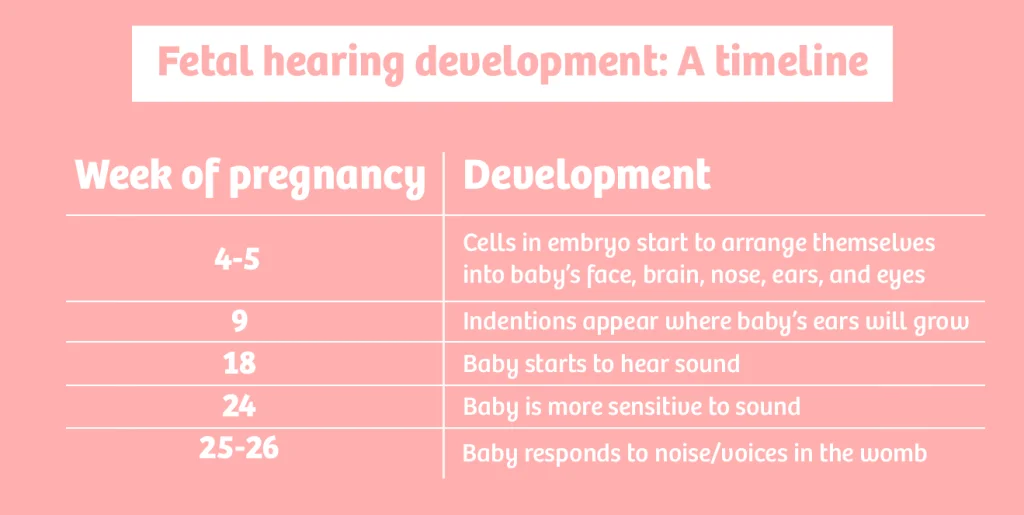Benefits of Music during pregnancy for mother and baby
You were told to eat healthy, rest, and take your vitamins. But did you know Music is also as beneficial during pregnancy? Read on to learn more about the vast benefits of music.


Benefits of music during pregnancy for the mother
It is proven that music has a role in brain development before birth. Listening to music during pregnancy will not only have a soothing and uplifting effect on the pregnant woman, but also a positive influence on the unborn baby. Around 16─18 weeks of pregnancy, the little one hears its very first sound.
Science has proven that, in the last few months of pregnancy, an unborn baby can recognize her mother’s voice, and her native language, and even begins to remember word patterns and rhymes.
Studies have shown that listening to music while pregnant can benefit both the mother and the unborn baby in many ways.
Listening to music is an easy way to lift the mood or relieve stress. Because of its healing power, music therapy has been used since ancient times to treat a variety of physical and mental problems.
It's normal to feel a little worried and stressed when you're pregnant. But high levels of stress and anxiety during pregnancy can increase the risk of miscarriage, preterm delivery, and a baby born with low birth weight.
Maternal anxiety early in pregnancy is also linked to a child's susceptibility to attention deficit hyperactivity disorder (ADHD) years later.
Listening to music may help calm your mind and uplift your mood, which in turn helps lower your stress and anxiety levels. Music can also reduce any stress that the fetus may feel in the womb, say experts.
Music can evoke positive emotions, which in turn can create a prenatal stimulation that will help you to bond with your unborn baby. A stronger connection with your unborn child can enrich you and your baby's lives.
Benefits of music during pregnancy for your baby
1- Hones auditory senses:
Music will appear to be rhythmic sound waves to your baby. The baby concentrates on these, and this stimulates cognitive skills and auditory senses while improving reflexes.
2- Promotes personality development: It is believed that the type of music you listen to during pregnancy can help formulate the personality of your child as he or she grows up. Thus, soothing music might encourage a calm and quiet demeanor while loud music might bring aggressive traits to the fore.
3- Eases stress: Music relaxes you and calms you when stressed or anxious. This, in turn, soothes and calms your baby too. It is thus an effective way of dealing with stress during pregnancy.
4- Enhancing brain activity:
Music can help to make the baby’s brain more active. And helps develop listening and speech skills, emotional health, and mental alertness. Newborn babies can remember a version of a song up to four months after they’re born, for example. Babies are also born with an innate ability to detect musical beats.
5- Increase bonding with the mom:
From at least the 6th or 7th months of pregnancy, mother and child are in a state of intense communication that can grow as the date of the delivery draws near. For instance, listening to the same music or song can provide the mother and baby with a feeling of continuity and companionship.
6- Enhance and stimulate verbal expression:
Research has found that babies respond to music they heard before they were born, with movement, or by staring at the source of the music.
7- Enhance social and emotional development:
The voice of parents, as well as music, affects the baby’s auditory system, and amazingly can impact her social and emotional development.
What type of music should a mom listen to?
In the third trimester, the baby will be able to hear the music you play. Classical music, gentle sounds like lullabies, and nice melodies that inspire happiness all are designed to be soothing.
Is any particular music better for a baby? I say simple tunes are best, but nearly anything you enjoy is just fine. The key is to listen because you like it.
If you’re stumped for good tunes, there are several playlists on music websites that people have curated just for pregnancy. Some focus on music for meditation, some focus on positive pop music. The options are endless.
The best times to listen to music during pregnancy
A baby’s sense of hearing doesn’t go “online” all at once. It happens in steps, and every baby develops at his or her own pace. And of course, sounds get muffled in the womb — especially sounds at higher frequencies.
So it isn’t a straightforward question to answer — the age at which your baby will be able to hear your favorite tune.
We know that babies can hear some sounds during the second trimester of pregnancy, and by 25 weeks gestation, approximately half of all fetuses are responsive to tones in the range of 100-500 Hz — a range that overlaps with adult speech. So, babies might be capable of hearing music — or at least some fragmentary elements of music — that also fall into this range.
But for better listening abilities, we have to wait until babies are a bit older — around 30 weeks or more.
For instance, most babies don’t respond to tones as high as 1000 Hz (which is just a smidge lower than “high C” on a keyboard) until at least 30 weeks gestation.
And when researchers presented fetuses with an entire lullaby — as opposed to a few, isolated tones — they found evidence that babies begin paying more attention to music at around 33 weeks gestation.
When can the baby start listening while inside the womb?
As pregnancy progresses, many women speak to the babies growing in their wombs. Some mothers-to-be sing lullabies or read stories. Others play classical music to boost brain development. Many encourage their partners to communicate with the baby too.

Around 16-18 weeks of pregnancy, the little one hears its very first sounds. The inner ear connects with neurons in the brain responsible for processing sounds.
By 24 weeks, the little ears start to develop rapidly, and babies have been shown to turn their heads in response to voices and noise.
Her sensitivity to sounds will improve even more as the weeks pass, throughout the first and second trimesters.
The limited sounds your baby hears around this point in your pregnancy are noises you may not even notice. They are the sounds of your body. These include your beating heart, air moving in and out of your lungs, your growling stomach, and even the sound of blood moving through the umbilical cord.
Listening to music during pregnancy will not only have a soothing and uplifting effect on the pregnant woman, but also a positive influence on the unborn baby.
The positive vibes create a prenatal stimulation that will help the mom bond with her newborn baby.
Find out Benefits of Montessori toys for babies






